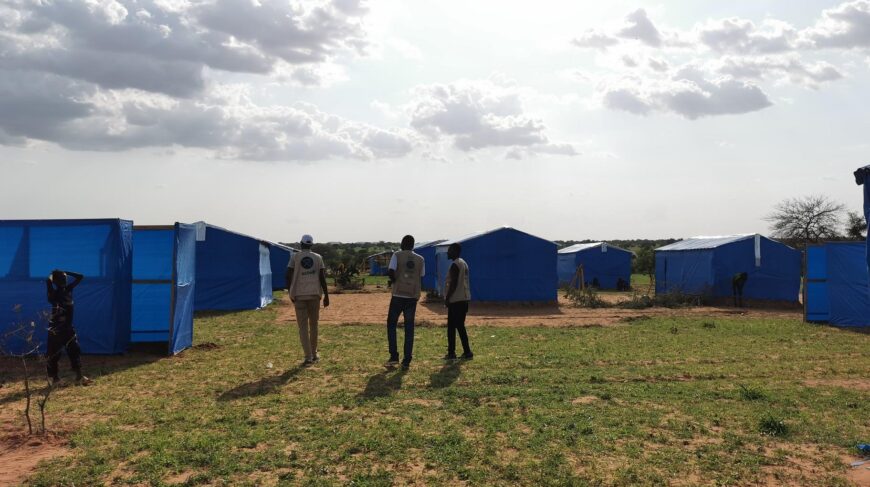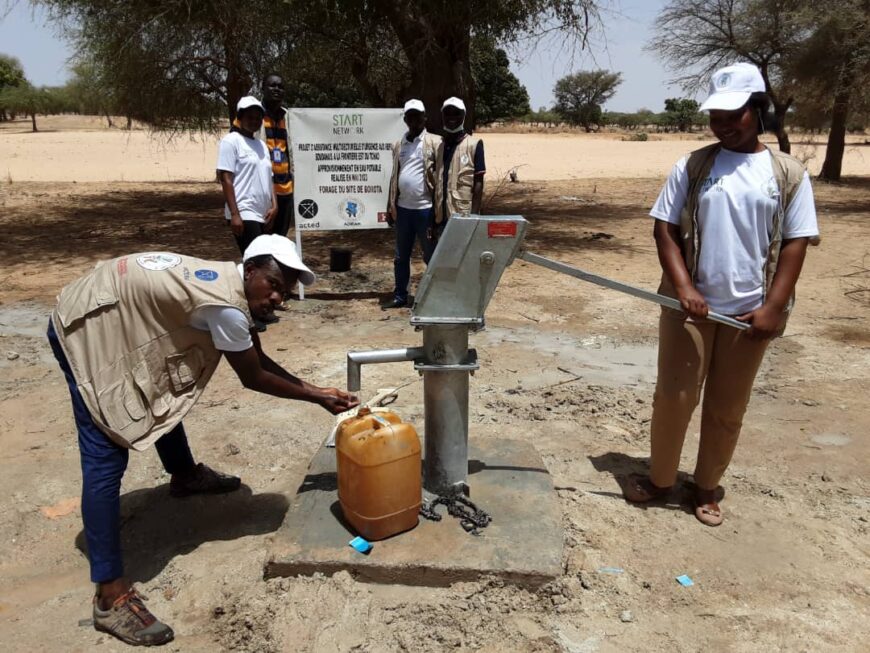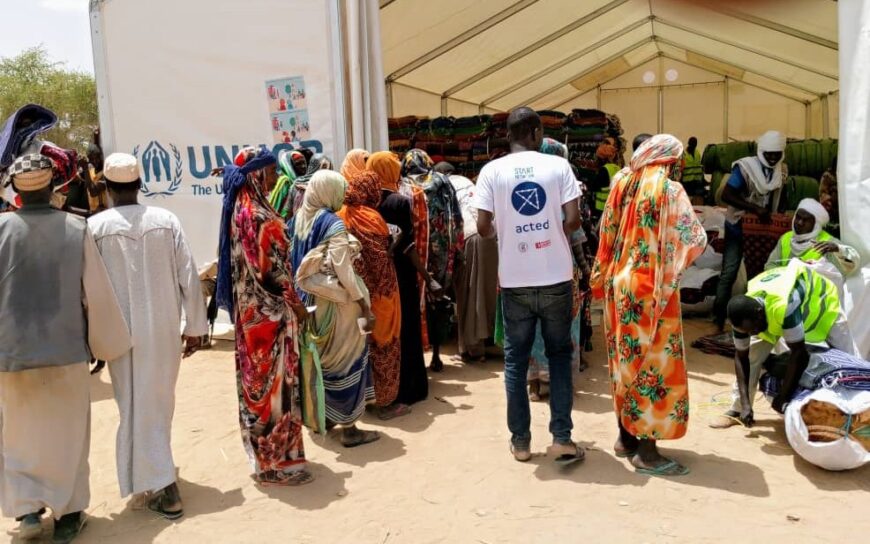Since armed clashes broke out in Khartoum on April 15th, 2023, the country has been ravaged by over 500 days of war. Since the start of the conflict, more than 9 million people have been internally displaced, and over 3 million have fled to neighbouring countries such as Chad, South Sudan or Libya, according to UNHCR. Due to the fighting, more than 25 million people living in Sudan – more than half of the country’s population - now face high levels of food insecurity. With no indications of a political solution to this conflict, the situation will only deteriorate – both for the Sudanese still living inside Sudan, and those who have fled to neighbouring countries.
In Sudan
54% of the population living in acute levels of food insecurity, 9 million of which are in need of immediate food assistance
Given the current context and the continuation of fighting, these figures are expected to rise dramatically in the coming months. Beyond the unprecedented levels of food insecurity, humanitarian needs remain high throughout the country:
- Basic services have collapsed in large parts of the country due to ongoing fighting. The hospitals, water facilities, and other public services that remain operational have become strained due to the large numbers of IDPs fleeing to safe areas.
- Many of Sudan’s 9 million new IDPs have been displaced multiple times due to the spread of the conflict. While 51% of IDPs are living with host families, trends are showing increasingly that IDPs are shifting to camps and informal settlements, with 24% of IDPs living informally either in public building, like schools, or in open areas.
- Conditions in IDP sites remain poor. Overcrowding in sites has led to deterioration in the facilities, creating unhygienic and unsanitary environments. These conditions have been exacerbated by widespread flooding in the country over the past months. Since the start of the conflict, rates of cholera have continued to rise, with 2,895 cases of cholera and 112 deaths reported between July and September this year. The real numbers are likely higher.
- Sudan’s economy has been devastated by this conflict. Supply chains have been severely disrupted, particularly due to challenges in moving goods across conflict lines. Since the start of the war, the value of the Sudanese Pound has deteriorated, with over 400% inflation in the black market rate compared to exchange rates prior to the conflict.
- Due to continued fighting, access to frontline areas remains limited. In El Fasher’s Zamzam camp, famine conditions have been reported – the first report of famine conditions globally since 2017. Fighting has recently limited access to two Acted bases, due to a lack of cross-border and cross-line movements to Blue Nile and White Nile States.
Since the start of the war, Acted has reached over 150,000 individuals with emergency, lifesaving assistance.
Despite these challenges, Acted has managed to scale up its response and reach the most vulnerable in the country. As member of the Cash Consortium of Sudan, Acted has reached 7,349 households (40,949 individuals) with multipurpose cash assistance since the start of 2024. Acted aims to reach 7,403 more households (44,094 individuals) before the end of 2024. Acted has scaled up it’s support to local response actors, supporting 11 community kitchens, takeya, in the Karari neighbourhood of Khartoum.
Acted remains a key actor in serving those in hard-to-reach areas. Despite Acted’s bases in White Nile and Blue Nile being cut off from the rest of the country, Acted remains operational in both states and has scaled up its response in each since the start of 2024. Acted was also one of the first humanitarian actors to reopen a base in Khartoum state. In these hard-to-reach areas, Acted has been providing emergency cash assistance, while rehabilitating WASH infrastructure, including latrines at IDP site and water points, to ensure improved living conditions and access to safe drinking water for Sudan’s vulnerable displaced and host communities. Acted remains committed to working on the frontline to meet the needs of the Sudanese people. With your support, we can scale up our response in Khartoum State, seeking to support more community kitchens and expand our programming to newly accessible parts of the state.

In Chad
910 000 individuals including 213 339 Chadian returnees have crossed the border from Sudan into Chad, adding to the existing 430 000 refugees of the previous Darfour crisis.

In South Sudan
Since the beginning of the conflict in April 2023, over 820,000 individuals have fled from Sudan into South Sudan
More than 80% of these arrivals (660,000 individuals) have arrived through the Joda/Wunthow border point in Renk County, Upper Nile State, where Acted manages reception and transit centres, providing crucial displacement management, shelter, and light protection assistance in response to the crisis.
The nearly one million new arrivals to South Sudan have been driven by severe conflict in the southern half of Sudan, where the majority of Sudan’s population lives, and violent competition between armed groups for control of border areas. Active conflict, combined with a collapse of civil services in conflict areas, is creating immense push factors for displacement to South Sudan, driving immense protection risks, and reducing access to basic services for already vulnerable populations.
Humanitarian conditions in South Sudan are critically insufficient to meet the needs of displaced populations, whose arrival acts as a shock of its own for many host communities in South Sudan, where more than two-thirds of the country face acute (IPC 3) or higher food insecurity. Ongoing climate shocks since 2019 – in the form of severe flooding during rainy season and increased drought during dry seasons – also serve to restrict mobility of both displacing populations and humanitarian actors, making it increasingly difficult to bring basic services to people in need.
Acted has been in South Sudan since 2007 providing a combination of lifesaving emergency assistance and development programming
Acted’s interventions focus on supporting resilience in emergencies, through a community-based model focused on accountability to affected populations. In response to the Sudan crisis, through emergency reception services, Acted has been at the frontline of the humanitarian response for more than 660,000 displaced individuals arriving in Joda from Sudan. These frontline response services include:
- Temporary Shelter – providing emergency accommodation for displaced populations, many of whom have been walking for days or weeks, fleeing the conflict in Sudan.
- Emergency WASH services – providing access to safe hygiene, latrines, showers, and water; dignity maintaining basic services.
- Emergency Response Management (CCCM) – providing dignified access to information requests, referrals, complaints and feedback mechanisms, and community-based engagement and social cohesion for displaced communities; and information management, dead body management, safety audits, and community support and organization for the partners
- Light protection – providing robust protection referral systems from the moment a displaced person crosses the border – critical for people fleeing areas with severe protection risks, through to their onward movement.
- Mobile Emergency Response (CCCM) – providing emergency reception of displaced individuals at informal border points, ensuring safe passage to areas of service provision in Renk.
However, with the onset of the dry season in Sudan in October-November, fighting and consequent displacement to South Sudan are expected to increase in intensity.
Taken together with South Sudan Inter-Cluster Coordination Group projections – and assuming a continuation of the war in Sudan – it is not unlikely that more than half a million people displace to South Sudan in the coming 6-12 months.
This emergency is not going away at the end of this month or at the end of this year. We are entering a period of likely instability in South Sudan – with political uncertainties and economic decline – just as we expect the Sudan crisis to have a spike in impact in this country. To effectively continue our operations – as the only agency with a track record proving we can do this work – we need sustained support through 2025. In a contingency scenario, even a temporary pause of Acted’s emergency reception response work could have significant knock-on effects, sending an overwhelming caseload to the rest of the response.
In Libya
Over 180,000 Sudanese refugees now present in the country
The primary municipalities hosting these refugees include Alkufra, Ejdabia, Benghazi, and Tripoli. In Alkufra, a largely desertic and sparsely populated area in southeastern Libya, more than 30,000 Sudanese refugees have arrived, with over 250 individuals crossing the border daily between January and May 2024. According to the REACH Rapid Needs Assessment conducted in Alkufra in June 2024, refugees are facing severe challenges, particularly in terms of shelter, with many living in makeshift or unfinished structures. Access to healthcare is critically insufficient: 28% of households reported health issues, but half of them were unable to obtain care due to long wait times, high costs, and unavailability of services. Food security is also fragile, with 75% of households experiencing hunger. Additionally, many of the arrivals are families, including unaccompanied children, and access to education for children is hindered by the lack of civil documentation, which has often been lost during their displacement. Urgent humanitarian intervention is needed to reinforce the protective environment and provide shelter, healthcare, food, sanitation, and education to address the growing needs of this vulnerable population.
Acted has been active in Libya since 2011, operating from its bases in Tripoli, Benghazi, Derna, and Sebha. As part of its decade-long efforts to strengthen Libyan civil society, Acted has built a network of over 100 CSOs, enabling it to intervene across all of Libya. Following the 2023 floods in Eastern Libya, which displaced tens of thousands and caused widespread destruction, Acted provided multi-sectoral emergency assistance to over 40,000 affected people. This response included WASH, infrastructure rehabilitation, cash assistance, psychosocial support, non-food items, and community-led initiatives. Aligned with its mission to save lives and support those in need, Acted is prepared to scale up its assistance to Sudanese refugees, pending increased funding.
Although Alkufra serves as the main entry point for Sudanese refugees, currently hosting over 30,000 individuals, international actors face significant access restrictions imposed by local authorities. However, Acted has developed a network of local CSOs in Alkufra, which could be mobilized to enhance assistance efforts. Acted also has extensive experience in protection monitoring and helpline services in eastern Libya and aims to extend its programming to Alkufra and Ejdabia. Social cohesion and conflict sensitivity will be central to the protection efforts, with plans to establish referral pathways and monitor evolving protection needs. While cash interventions for migrants and refugees face administrative hurdles, Acted intends to offer cash-for-health assistance through a health card mechanism. With its expertise in child protection and education, Acted is poised to expand its support to Sudanese schools in Benghazi, Libyan schools accommodating Sudanese students, and informal clubs for children unable to access formal education. Additionally, quick impact projects aimed at rehabilitating public infrastructure could help strengthen basic services in areas heavily affected by the refugee influx. Acted is also committed to training and empowering local civil society to enhance the response to the Sudanese refugee crisis.
With your support, we can expand our response in eastern Libya, helping Sudanese children access education and reinforcing protection mechanisms for them and their families.
